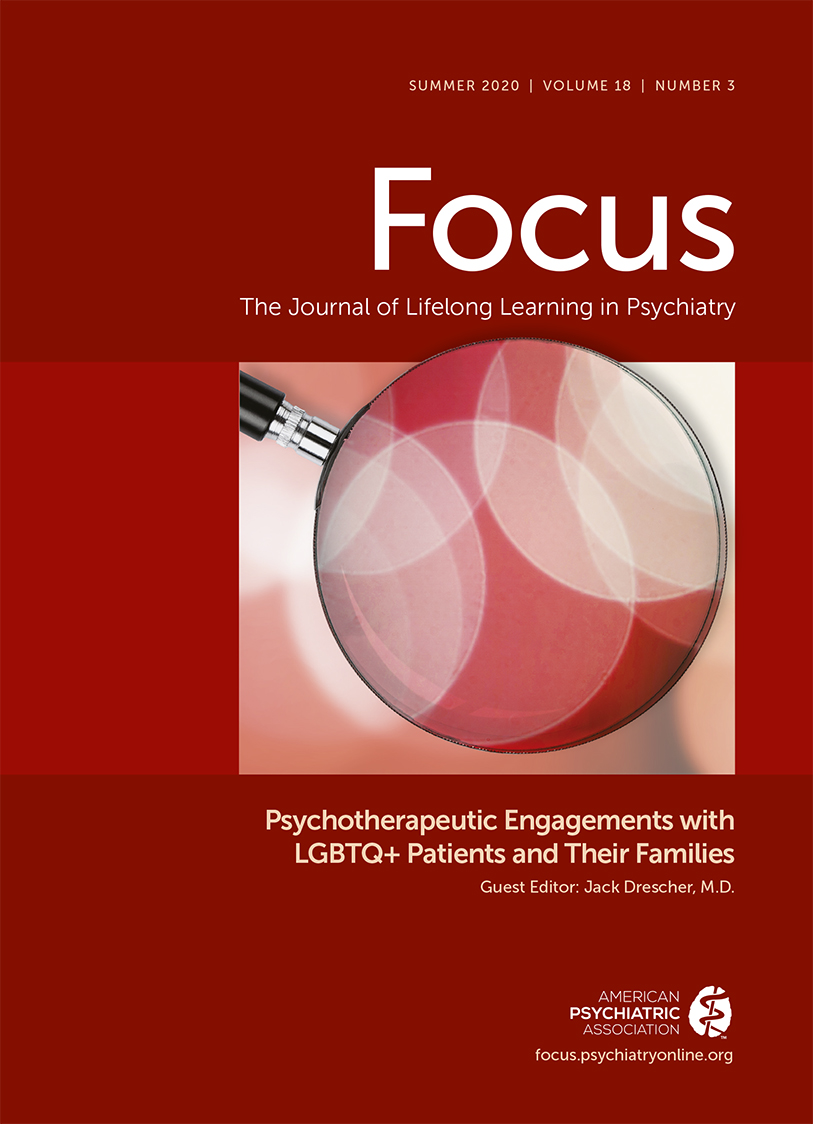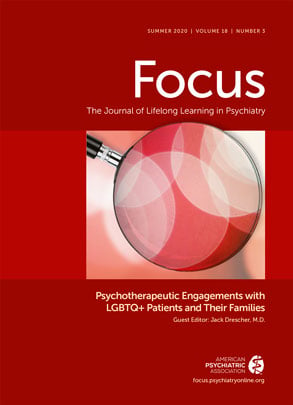Treating Family Members of Transgender and Gender-Nonconforming People: An Interview With Eric Yarbrough, M.D.
I am large, I contain multitudes.—Walt WhitmanQuestion: What guidance would you provide to psychiatrists and other mental health professionals working with families of individuals in transition?
Expert Interview and Examples
Case 1: A Supportive Parent of a Transitioning Adult Child
Stephanie is the mother of a 21-year-old transgender man, Greg, who had come out as a lesbian at age 15. Stephanie is a mental health administrator in a rural part of the Pacific Northwest who frequently interacts with psychiatrists but has never received mental health treatment. Greg’s chosen pronouns are now “he/him/his.” Greg had some difficulties with alcohol and cannabis use earlier in his life. Stephanie is a single mother; Greg’s father left the family when Greg was very young and is rarely in contact with him. Stephanie is, and has always been, very supportive of her son, including telling her own family of origin that they had to accept Greg’s gender transition. She read a recently published book on transgender mental health as well as Laura Erickson-Schroth’s book Trans Bodies, Trans Selves: A Resource for the Transgender Community (8) in a single sitting.
She does feel hurt that Greg “rejected” his birth-assigned name in favor of a more male-identified name. Greg appreciates his mother’s support but feels upset when he overhears her misgender him when talking to old friends about Greg’s childhood. He is in therapy but wishes he could find an LGBT clinician who “wouldn’t just talk about sexual orientation and gender,” as he is concerned about other areas of his life. He also wishes that his mother had sought therapy when he first came out. He feels that his mother fears that something about her mothering “made him trans.”
Case 2: Different Reactions in Parents of Transitioning Adult Child
Walter is the 55-year-old father of a 26-year-old transitioning gender-nonbinary person, Kevin, whose preferred pronouns are “they/them/their.” Identified male at birth, at the end of college, they seemed to suddenly develop great difficulty completing school and moving ahead with life. Depression and attention-deficit hyperactivity disorder were diagnosed and treated, and Kevin then came out, initially as a “demi-guy” and now as nonbinary. They have recently begun taking female hormones and are considering a name change. Kevin completed college and is working and continuing treatment. Both parents have been in individual long-term treatment with psychotherapy and medication. Both were initially shocked at their child’s gender changes. “Is this a phase?” the parents asked their individual clinicians. “Kevin never said anything to us about this before.” One parent has had more difficulty than the other in accepting Kevin’s transition, including pronoun changes.
Case 3: Feelings of Grief in Family Members of Transitioning Individuals
Lynn (a 60-year-old woman in integrated psychotherapy and psychopharmacological treatment for chronic depression and migraines) is the aunt of 24-year-old Olivia. Olivia’s mother died when Olivia was very young, and Lynn became a mother figure to her. Olivia began identifying as a lesbian in college and has long been interested in issues of gender and social justice. Recently, Olivia began taking testosterone and adopted “they/them/their” as preferred pronouns. They asked only their father and his girlfriend to use these pronouns, however, and have not specifically asked Lynn or their grandmother to do so. Lynn expresses profound feelings of loss, grief, and sadness at this transition. She also expresses disbelief, asking, “Isn’t it just because her mother died and she never got the attention she needed from her father that she is doing this?”
Case 4: Grandmother Responds With Hostility
Elizabeth is the 74-year-old widowed maternal grandmother of two young teenage girls who live in another country with their parents. Elizabeth has been seeing a psychiatrist episodically for several decades for medication treatment of anxiety and depression. She told him that she was outraged and upset that the older of the two grandchildren had announced that she would be transitioning to be a boy and asked the parents (but not Elizabeth) to use “he/him/his” as pronouns when referring to him. Elizabeth is worried about her upcoming annual trip to visit them and angrily says: “I’m losing my grandchild!” She takes the transition as a personal affront and, after two appointments with her psychiatrist, is unwilling to continue treatment. If the transition could not be stopped, she did not see what good individual treatment could do for her.
Case 5: Spouse Questions Own Identity When Partner Transitions
Pam, a 37-year-old cisgender married woman, was referred to a psychiatrist by her psychotherapist for the continuation of medication for her chronic anxiety and depression. She and her spouse had recently moved from a distant state and are looking for work. While reviewing her history, she reported that her spouse is currently transitioning gender. Raised as male from birth, Pam’s spouse had several surgical procedures very early in life and had felt himself to be a fairly feminine man. At 34, Dennis, now Deena (chosen pronouns are now “she/her”), was told by her parents that she was, in fact, born intersex. She decided to transition and has begun hormonal treatments and presenting as a woman, very happily. Pam, however, reports feeling unmoored. “My husband is now my wife, and I never thought of myself as a lesbian,” she said. The couple remains together, and they are working with their psychotherapist on all of these issues.
References
Information & Authors
Information
Published In
History
Keywords
Authors
Funding Information
Metrics & Citations
Metrics
Citations
Export Citations
If you have the appropriate software installed, you can download article citation data to the citation manager of your choice. Simply select your manager software from the list below and click Download.
For more information or tips please see 'Downloading to a citation manager' in the Help menu.
View Options
View options
PDF/EPUB
View PDF/EPUBLogin options
Already a subscriber? Access your subscription through your login credentials or your institution for full access to this article.
Personal login Institutional Login Open Athens loginNot a subscriber?
PsychiatryOnline subscription options offer access to the DSM-5-TR® library, books, journals, CME, and patient resources. This all-in-one virtual library provides psychiatrists and mental health professionals with key resources for diagnosis, treatment, research, and professional development.
Need more help? PsychiatryOnline Customer Service may be reached by emailing [email protected] or by calling 800-368-5777 (in the U.S.) or 703-907-7322 (outside the U.S.).

